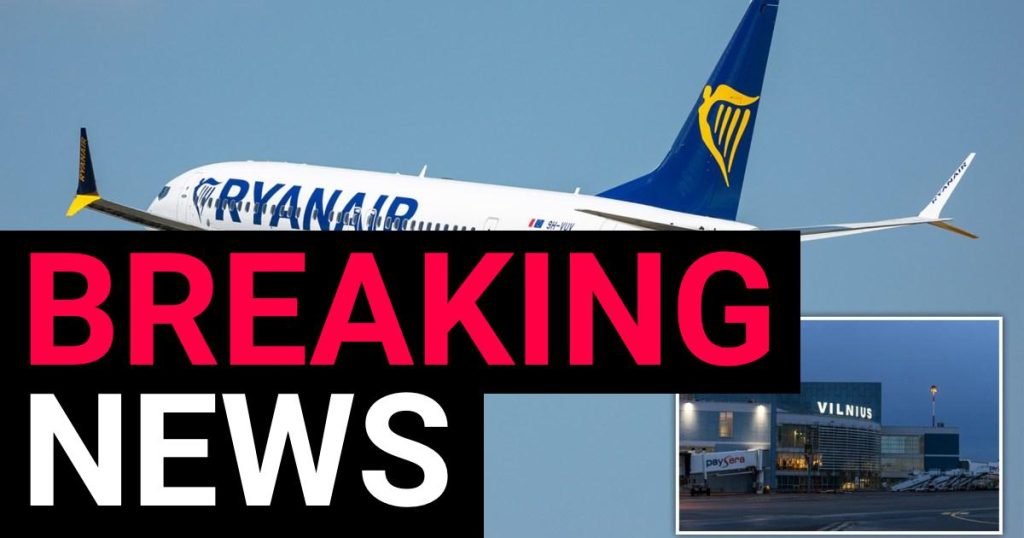Paragraph 1: The Incident and Immediate Aftermath
A Ryanair flight en route from London Luton Airport to Vilnius, Lithuania, experienced a sudden disruption on Thursday, forcing it to abandon its landing approach and divert to Warsaw, Poland. The aircraft, already in its descent phase towards Vilnius Airport, was rerouted after encountering what has been described as GPS signal interference. Lithuanian air navigation authorities confirmed the incident, emphasizing that the pilot made the rapid decision to divert. While other aircraft continued to land at Vilnius Airport without issue, the Ryanair flight’s abrupt diversion raised concerns about the nature and source of the interference. This incident occurred against a backdrop of increasing reports of similar GPS disruptions in the region, particularly near the border with Russia and Belarus, raising suspicions of deliberate interference.
Paragraph 2: Growing Concerns Over GPS Interference
The incident involving the Ryanair flight is not an isolated occurrence. Over the past three months, Lithuania has reported over 800 instances of GPS interference, a dramatic increase from the 124 cases reported during the same period in 2023. This surge in reported incidents mirrors similar trends observed in neighboring countries Estonia and Finland, both of which share a border with Russia and Belarus. The escalating frequency of these disruptions has prompted investigations and heightened concerns about the potential impact on aviation safety. The proximity of these incidents to the NATO border adds another layer of complexity, raising questions about possible geopolitical motivations.
Paragraph 3: Allegations and Denials of Russian Involvement
Suspicions surrounding the source of the GPS interference have largely focused on Russia and Belarus, particularly given the ongoing geopolitical tensions in the region stemming from the conflict in Ukraine. Both Estonia and Finland have previously attributed similar GPS jamming incidents to Russian activity, particularly during military exercises near their borders. In the UK, reports have emerged that around 4,000 flights have been affected by suspected Russian GPS interference since the onset of the war in Ukraine. Despite these accusations, the Russian government has consistently denied any involvement in these disruptions, dismissing the claims as unsubstantiated.
Paragraph 4: Impact on Aviation Safety and Countermeasures
The increasing prevalence of GPS interference poses a significant threat to aviation safety, forcing pilots to rely on alternative navigation methods and potentially increasing the risk of accidents. In response to these challenges, some airports in Finland have been compelled to reintroduce older radio navigation equipment as a backup to GPS systems. This highlights the disruptive potential of GPS interference and the need for robust countermeasures to ensure the safety and reliability of air travel in the region. The incident involving the Ryanair flight underscores the vulnerability of modern aircraft to GPS disruptions and the need for swift and decisive action by pilots in such situations.
Paragraph 5: Investigations and the Search for Answers
Following the Ryanair incident, Lithuanian authorities launched an investigation to determine the cause of the GPS interference and identify any potential perpetrators. This investigation will likely involve analyzing flight data, radar information, and other relevant evidence to pinpoint the source of the disruption. Given the sensitive geopolitical context and the potential implications for regional security, the outcome of this investigation is likely to be closely watched by neighboring countries and international organizations. Understanding the nature and origin of these interference events is crucial for developing effective countermeasures and preventing future incidents.
Paragraph 6: The Broader Context and Future Implications
The incident involving the Ryanair flight and the broader pattern of GPS interference in the region highlight the growing vulnerability of critical infrastructure to electronic warfare and cyberattacks. As reliance on GPS technology increases across various sectors, from aviation to maritime navigation and even financial transactions, the potential consequences of such disruptions become increasingly significant. The ongoing investigations and the response from affected countries will likely shape future strategies for mitigating the risks posed by GPS interference and ensuring the resilience of essential services. The incident serves as a reminder of the complex security challenges posed by emerging technologies and the need for international cooperation to address these threats effectively.


